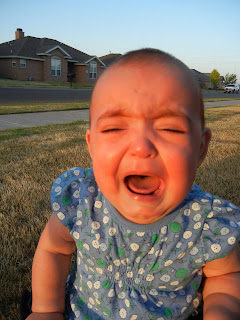I'm not opposed to saying the word "no" to your children. And personally, I believe in saying it early. I am so sick of going to restaurants and seeing kids running around and disturbing others. I'm sick of the saying "kids will just be kids" when the kids are in fact just being brats ... and continue to be brats for too long.
I've always had this opinion but when you don't have kids, you're not "allowed" to have them. Before Liliana was born, I would make statements such as "well when we have kids, we'll still watch TV while they sleep because they need to learn to sleep with some noise." And all that I was told was "just wait until you have kids." I can proudly report that as I type this, my TV is on, and Liliana is taking a nap. Oh and before you ask, it's on at a reasonable level ... not on mute.
When Liliana started doing things, such as yanking on my necklace, I immediately started saying "no." The first time she did it? It didn't go well.
She laughed.
At 3 1/2 months of age, Liliana laughed at me for saying "no." And I did it in a stern voice too!
But with time, the "no"s have continued. When she does something REALLY bad (like try to put her finger in the electrical socket) she gets a big NO and a little slap on her hand. And I don't believe that I should say "no" and then give her another toy. If she's trying to play with the remote (her favorite thing in the world after food), I tell her no and that's that.
Yes, she tries throwing tantrums. In fact, we get a face very similar to this:
But slowly but surely, the temper tantrums are lasting shorter and shorter. If I tell her "no" she quickly takes her hand off whatever she's holding. She KNOWS what it means already. And she even shakes her head "no" sometimes too!
But I'd rather her TRULY know the meaning of it because the last thing you want is to realize they don't understand right AFTER they put a nickel in their mouth and swallow it. OR in my case, right after Liliana ate the little gravel at the bottom of the fireplace.
I think the word "no" is so very important with children. And I know that when she's 2 or 3, it will get harder because it will start to be the ONLY word I get to use! ha.
But I feel that starting from when they're YOUNG (you know, when they were 3 1/2 months and started trying to take your earrings out and yanking them so hard that you want to yell) is so useful.
There isn't a parenting rule book. That's something my parents always tell me. And it's so true. But I'm pretty sure that using the word "no" in a useful, not mean, but helpful style can definitely be in a rule book ...
The good news is that even AFTER you say no ... your sweet baby will still want to be with her Mommy and Daddy.
Park City Utah
3 years ago














I don't have kids (yet) but I definitely agree with you! Nothing wrong with "no" at all!
ReplyDeleteI love this post Cristy!! Totally agree with you that the meaning of "no" is something that all kids need to understand. I didn't know that parents aren't allowed to watch tv while the kids nap btw! How funny!!
ReplyDeleteI completely agree! My child will learn no very early on.
ReplyDeleteYES! I mean NO! hehe :)
ReplyDeleteKids do need to know what no means, and know that they need to listen!! I too, have very little tolerance for bratty kids.
On a positive note, I have a great giveaway on my blog today! You should come check it out!! :)
I agree! We tell The Boy "no" when appropriate.
ReplyDeleteI think when they get older and you feel like you're constantly telling them "no", that's when you start finding more positive ways to say it, explaining why you're saying no, and offering alternatives. But maybe you're right and if they start hearing an unqualified "no" early, it stops bothering them. I just remember how frustrated I would get as a kid when my parents were constantly saying no and I could never figure out why. Then again, they would say no angrily, instead of in a matter-of-fact way. When K was smaller, I'd say things like, "Not for K," or "Not for eating," instead of just saying no all the time.
ReplyDelete